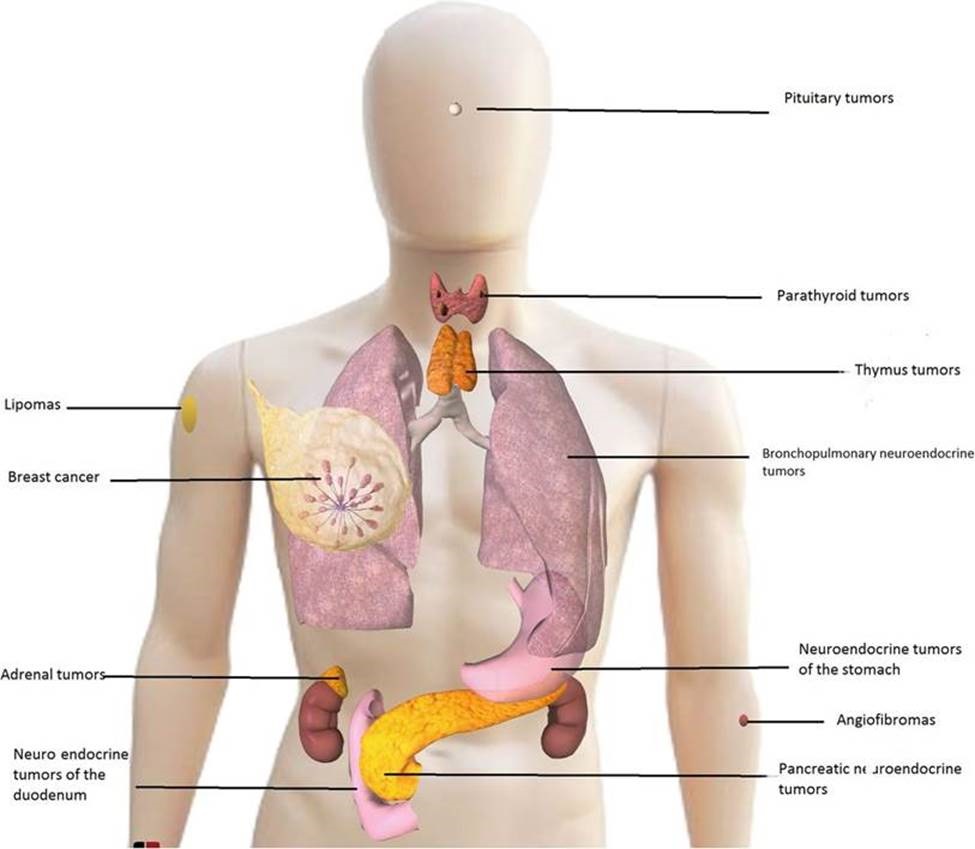Overview
Multiple Endocrine Neoplasia (MEN1) is an inherited disorder that causes tumors in the endocrine glands and the duodenum, the first part of the small intestine. MEN1 is sometimes called multiple endocrine adenomatosis or Wermer’s Syndrome, after one of the first doctors to recognize it. MEN1 is rare; occurring in about one in 30,000 people. The disorder affects both sexes equally and shows no geographical, racial, or ethnic preferences.
Endocrine glands release hormones into the bloodstream. Hormones are powerful chemicals that travel through the blood, controlling and instructing the functions of various organs. Normally, the hormones released by endocrine glands are carefully balanced to meet the body’s needs. In MEN1, the overactive glands may include the parathyroids, pancreas, or pituitary.
In people with MEN1, multiple endocrine glands form tumors and become hormonally overactive, often at the same time. The overactive glands may include the parathyroids, pancreas, or pituitary. Most people who develop overactivity of only one endocrine gland do not have MEN1.

Procedures and Tests You Will Have
EXAMS AND TESTS
The health care provider will perform a physical exam and ask questions about your medical history and symptoms. The following tests may be done:
For further info please click on the test and procedure.
TREATMENT
Surgery to remove the diseased gland is often the treatment of choice. A medicine called bromocriptine may be used instead of surgery for pituitary tumors that release the hormone prolactin.
The parathyroid glands, which control calcium production, can be removed. However, it is difficult for the body to regulate calcium levels without these glands, so a total parathyroid removal is not done first in most cases.
Medicine is available to decrease the excess stomach acid production caused by some tumors (gastrinomas), and to reduce the risk of ulcers.
Hormone replacement therapy is given when entire glands are removed or do not produce enough hormones.
SOURCE: U.S. National Library of Medicine; MedLinePlus
QUESTIONS TO ASK THE DOCTOR:
- Are you familiar with the different types of MEN?
- Are you familiar with the different types of MEN from the symptoms to diagnosis to treatment?
- What kind of medical testing will you be performing and where and in what sequence?
- Do you have MEN individuals in you practice at this time?
- Who will be the point person for the results of testing and consultations?
- MEN is a genetic mutation passed from parent to child at a rate of 50/50. When should I have my child tested for this genetic mutation?
- Are you willing to spend the time with me and possibility research and treat the symptoms I am having?
- Do you have a network of other specialists that know how to care for an individual with MEN?
- Do you have a treatment plan you follow for MEN individuals?
- Surgeons- Are you a member of American Association of Endocrine Surgeons (AAES)
- Are you familiar with AMENSupport at www.AMENSupport.org
SPECIALISTS YOU WILL NEED:
- Endocrinologist
- Endocrine Surgeon or surgical oncologist ( AAES member)
- Surgical Oncologist
Resources
Click a topic from the list below for more information.
- MEN1-related pancreatic NETs
- Prognostic factors for the outcome of nonfunctioning pancreatic neuroendocrine tumors in MEN1: a systematic review of literature
- MEN1 RESEARCH UPDATE
- TETANY RELATED TO LOW CALCIUM LEVELS OR HYPOCALCAEMIA
- PITUITARY GLAND AND MEN1
- PARATHYROIDS AND MEN1
- PANCREATECTOMY DIABETES
- PANCREAS AND MEN1
- RESEARCH UPDATE: MEN 1 AND ZES PATIENTS
- GENETICS OF MEN TYPE 1
